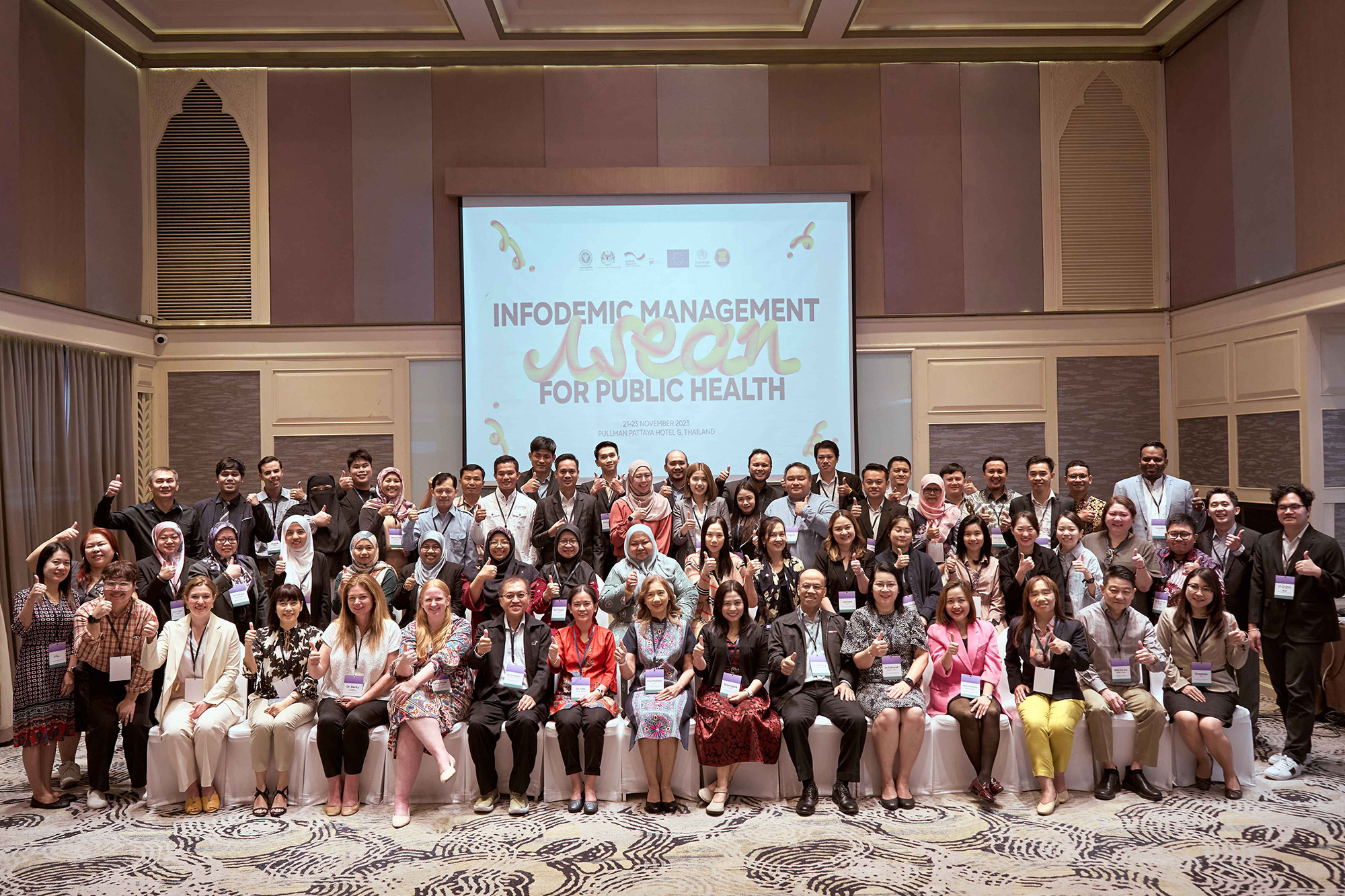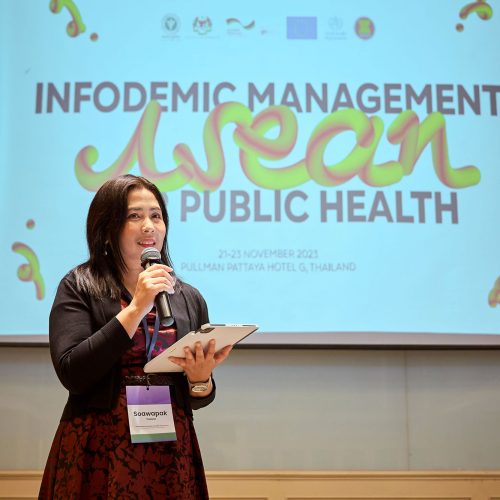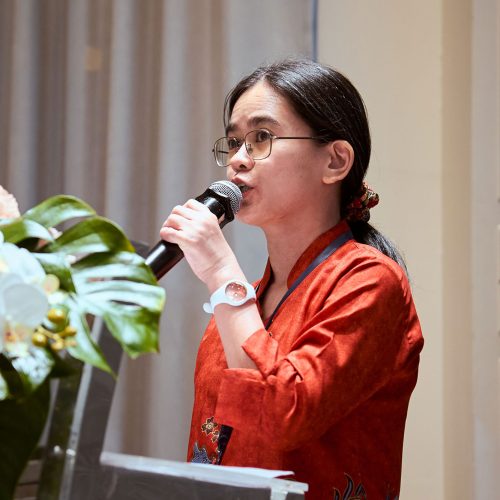ASEAN Training Strengthens Resilient Public Health Emergency Systems through Infodemic Management

Group photo of participants from the ASEAN member states, the World Health Organisation, GIZ, and Office of International Cooperation, the Department of Disease Control, Ministries of Public Health Thailand and Malaysia
- An ASEAN Regional Training Programme on Infodemic Management aimed to address the challenges posed by infodemics during public health crises, with a focus on building capacity among ASEAN member states.
- The training programme covers five key areas, namely, modules on infodemiology, fake news prevention, risk communication, behavioural science, and fact-checking skills.
- Public health officials acquired skills through experience sharing, enhancing their ability to deal with misinformation, creating community awareness, and developing risk communication nationally and regionally.
The challenge of combating misinformation in the fast-paced digital age during public health crises necessitates a proactive and collaborative approach. The 2021 study on Capacity Needs Assessment on Core Public Health Emergencies, including COVID-19 among ASEAN countries conducted by the German Federal Ministry for Economic Cooperation and Development (BMZ) and implemented by GIZ, in collaboration with ASEAN Health Cluster 2 (Responding to All Hazards and Emerging Threat) and the Office of International Cooperation, Department of Disease Control (DDC), Thailand, found that limited capacities hindered the ability of ASEAN member states (AMS) to cope with infodemics. To prepare and respond to future pandemics, the ASEAN Resilience through Capacity Building of Core Competencies in Public Health Emergency (ASEAN PHE) Project implemented by GIZ continues to support AMS in building capacity on public health emergencies, in particular, risk communication which is one of 8 core capacities to prevent the global spread of disease as required under the International Health Regulations (2005).
In collaboration with the Office of International Cooperation, the Department of Disease Control, Ministry of Public Health, Thailand, the ASEAN Emergency Operation Centre (ASEAN EOC) Network led by the Ministry of Health Malaysia, ASEAN Health Cluster 2 (Responding to All Hazards and Emerging Threats), World Health Organisation (WHO) Regional Office for South-East Asia and Western Pacific, and GIZ, the ASEAN Regional Training Programme on Infodemic Management in Public Health was organised. The hybrid training took place virtually between 14, 16 and 29 November 2023, and in-person from 21-23 November at Pullman Pattaya Hotel G, Thailand. The training was attended by 65 participants from 7 ASEAN Member States, including collaborators and partner organisations.

Dr Susheel Chandra Lekhak, Project Management Officer, WHO South-East Asia, gave opening remarks.
At the opening session, Dr Susheel Chandra Lekhak, Project Management Officer, WHO South-East Asia, reflected on the challenges posed by the overabundance of information during disease outbreaks, stating: “The COVID-19 pandemic has greatly highlighted the magnitude of the challenges posed by the overabundance of information and misinformation during disease outbreaks and other public health emergencies. We call this an infodemic – and in some cases, it grows even faster than the epidemic itself, especially in this age of digital connectivity.”

Dr Soawapak Hinjoy, Director, Office of International Cooperation, Department of Disease Control, Ministry of Public Health (Thailand), also delivered opening remarks.
Echoing this sentiment, Dr. Soawapak Hinjoy, Director, Office of International Cooperation (OIC), Department of Disease Control, Ministry of Public Health, Thailand, highlighted the universal nature of challenges. “In the face of global challenges, just as diseases transcend borders, so does misinformation,” she affirmed. “Today, united as a region, we acknowledge that our shared struggles necessitate unified action. Through the exchange of experiences, the pooling of knowledge, and the pursuit of innovative solutions, we move forwards collectively in a regional approach to health security, dedicated to the well-being of all.
The training aimed to equip participants with the tools and knowledge required for effective infodemic management. The curriculum consists of 5 learning modules: 1) Understanding infodemiology’s role in public health; 2) Addressing fake news and promoting fact-checking; 3) Developing proficiency in risk communication; 4) Exploring the significance of health behaviours and behavioural science in infodemic management; and 5) Gaining skills in utilising fact-checking tools.
What sets this initiative apart is its emphasis on a collaborative approach by uniting the strengths of collaborators and partner organisations with the goal of enhancing ASEAN health resilience and strengthening regional health cooperation by equipping health professionals’ capabilities to prepare, detect and respond to public health emergencies with the necessary tools to navigate the challenges posed by infodemics. Highlighting the necessity of addressing fundamental core competency gaps among AMS in public health emergency preparedness and response identified by the previous study, this collaborative training brought together public health officials from both national and subnational levels to learn effective tools and methods on risk communication for infodemics management in times of crisis.

Group Activity on fake news and how to build up a fact-checking culture in civil society.
This initiative not only created a network of risk communication for public health emergencies response in the region for future pandemics, but also provided AMS public health officials with a unique opportunity to gain necessary skills and knowledge on infodemics management by learning from case studies and the experiences of other AMS countries. They also increased their familiarity with fact-checking tools, preparing them to apply their knowledge and experience to improve community awareness, engagement, rumour verification, and support effective risk communication in public health within their country and the ASEAN region.

Mrs Pouchamarn Wongsanga, Project Director, GIZ Thailand, delivered opening remarks.
Pouchamarn Wongsanga, PHE Project Director, GIZ Thailand, stated during the opening remarks that “By working together, we can make a lasting impact on public health emergency and be prepared to prevent crises in the region.”

Dr Seok Hong Tan, Public Health Medicine Specialist, Ministry of Health, Malaysia, gave welcoming remarks.
Dr Seok Hong Tan, a Public Health Medicine Specialist from ASEAN EOC Network, Ministry of Health Malaysia, echoed these sentiments in her opening remarks. “The significance of the training is that it equips participants to combat misinformation, urges them to apply their newfound knowledge to safeguard people and jobs, and fosters a culture where fact-checking becomes the norm.”
This joint endeavour marks a crucial step toward ensuring efficient public health communication within the community and across the region, safeguarding the well-being of communities in times of crisis.
Pouchamarn Wongsanga
Project Director of PHE
Email:pouchamarn.wongsanga(at)giz.de
Dr Oraphan Tatha
Project Advisor of PHE
Email:oraphan.tatha(at)giz.de
Related project news